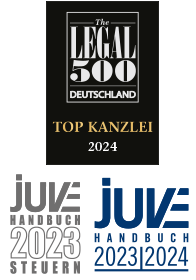- Tax Dispute
- Criminal tax law
- Voluntary Self-Disclosure
- Criminal Tax Proceedings
- Penalty for Tax Fraud
- Limitation Period for Tax Fraud
- Commencement of Criminal Tax Proceedings
- Tax Investigations / Search of Premises
- Freezing Injunction / Seizure of Assets
- Pre-trial Detention for Tax Fraud
- Corruption / Bribery
- Witness in Criminal Tax Proceedings
- Undeclared Income / Illegal Employment
- Criminal Risks for Directors of Limited Liability Companies
- Tax Compliance Management System (TCMS)
- Focus on Tax Compliance and Tax-CMS in Germany
- Missing trader intra-community (MTIC) fraud / VAT fraud
- Commercial Criminal Law
- Internat. Tax Law
- Tax Planning
- Corporate law
- Property Succession
Sales Tax Review
Legal and Tax Advice on Sales Tax Reviews
Concurrently to the introduction of the Tax Evasion Control Act (Steuerverkürzungsbekämpfungsgesetz), which came into effect on 1 January 2002, the so-called sales tax review was introduced in § 27 b of the Sales Tax Act (UStG). The Act was based on the realization by the Tax Authority, that the volume of sales taxes collected in some industries was nearing a total loss. Large numbers of bogus or fraudulent invoices were issued in the construction industry in Cologne, Berlin and other major cities, or the supply of goods was faked for the purpose of committing so-called missing trader intra-community fraud (MTIC) or “VAT fraud”.
Facts about the sales tax review
LHP Attorneys provide information on the definition of a sales tax review and the legislation, legal protection and voluntary self-disclosure.
1. What is a sales tax review?
Sales tax reviews are a measure by the Tax Authority structured similarly to § 210 Taxation Act (AO), which regulates the review measures of the customs authorities. The sales tax review is therefore closely associated with the domain of the tax inspection unit, which is authorized to conduct so-called preliminary investigations. One feature in common with the tax inspection authority is the utilisation of the element of surprise, because no audit notice is issued or other announcement is made. All commercial transactions of a company, which are subject to sales tax, may be the focus of a sales tax review. It is particularly concerned with matters, which lean themselves to a special sales tax audit. The Federal Minister for Finances published an administrative directive for the conduct of sales tax reviews in a letter exceeding 100 pages in 2002, which contains a schedule of circumstances suggesting a review: These include:
- input tax apportionment
- unusually high amounts of input tax
- input tax surpluses with a temporal link to newly formed companies
- entitlement to opt for tax exemption
- indicators hinting at invoices issued by bogus companies
Decisions by the responsible Tax Authority drawing on the new wording of § 18 d UStG can also result in a sales tax review. This regulation stipulates, that the Tax Authority may decide to make sales tax refunds subject to the provision of a security deposit, which in turn is subject to the consent by the affected company. A sales tax review enables the Tax Authority to address any doubts in respect of a claim for a sales tax refund. The rationale of the legislation emphasizes, that a sales tax review should have a factually and temporally narrow scope and the measure should not deflect from a field audit, which includes a special sales tax audit. This restriction is however not found in the literal wording of the law, it rather provides for a gradual transition into a field audit (§ 27 b Sec 2 UStG).
It is particularly because of the universal intervention authorities granted in a sales tax review, that the purpose of the sales tax review must remain the centre of attention. The exclusive purpose of a sales tax review is to ensure the consistent assessment and collection of sales tax (and not other types of taxes).
2. What are the powers of the Tax Authority in a sales tax review?
The UStG provides the Tax Authority with a broad range of powers in respect of the sales tax review. On request, accounts, business documents such as records or other documents pertaining to the facts must be produced, which are then subjected to the sales tax review. The taxpayer is also under a duty to cooperate (§ 27 b Sec 2 UStG). The duty to cooperate is limited to documents, which are relevant to the assessment of sales tax. The auditor in charge of the review must provide the company owner with an information leaflet outlining the process of a sales tax review and inform him orally about the precise reason and the scheduled extent of the measures.
Officers of the Tax Authority assigned to the review are permitted to enter the property and premises of persons, who own a company or are self-employed. No prior notice is required and the measure may take place during the business and working hours. The sales tax review is thereby not limited to the “usual” business or working hours as described in § 200 Sec 3 AO. This specifically means, that a sales tax review is also permissible outside the usual business or working hours, e.g. early in the morning or in the late hours of the day.
It is not regulated unambiguously, whether access to the business premises by way of direct enforcement in the meaning of § 331 AO could be achieved or enforced in practice, e.g. by the auditor calling on the assistance by the police. It is however undisputed, that a search of the residential or business premises is only permissible, if a search warrant is presented. The sales tax review is not considered a search of premises in the legal sense of the term, which means that access might be enforced, but access by itself is not suitable to conduct the review. It is essential for the review, that the auditor has access to, or has been provided with, all relevant documentation, but this cannot even be achieved with the assistance of the police, because otherwise it would constitute a search of premises for which a warrant issued by a judge is required.
In cases where the audited person opts not to cooperate and refuses the auditor access to the premises, the legal proximity of the sales tax review to the criminal tax law becomes a relevant factor. The tax auditor has the authority to order a search of the premises even without a search warrant issued by a judge, claiming a situation of imminent danger (§ 105 StPO). The tax officer is permitted to make a discretionary decision, if the refusal to cooperate by the company owner is interpreted as an initial suspicion of tax fraud, which is a reasonable conclusion if drawn in light of the company owner’s refusal to cooperate. The tax auditor may then argue, that the initial suspicion in conjunction with the refusal to cooperate constitutes a situation of imminent danger, and thus order and execute a search of premises.
Note by the tax law specialist from Cologne in respect of the sales tax review:
The Federal Constitutional Court has placed restrictions on the meaning of the term “imminent danger” and emphasized this in more recent decisions on current issues. This means, that a search of premises based on a search warrant issued by a judge must be the rule and a search without a search warrant must remain an exception.
- The determination of “imminent danger” must be justified by facts flowing from the individual case circumstances. Mere speculation, or considerations based on hypotheses, daily criminalistic experience or suspicions not associated with the actual case are insufficient.
- The precise meaning and use of this legal term are subject to unlimited judicial review.
- An effective judicial review of “imminent danger” by a court is subject to the condition, that the sequential connection of the reason for the decision and the result of the search are recorded and substantiated in the case files.
3. Is a search of residential premises permissible for a sales tax review?
The law grants special protection for residential premises. As set out in § 27 b Sec 1 S 2 UStG, they may only be entered against the will of the resident, if this is required to prevent serious risks for the public safety and public order. A risk is of a serious nature, if material legal interests will be violated unless prevented. While tax law is considered to be within the domain of public order, not each and any violation of tax regulations constitutes a serious danger of a certain gravity and relevance.
Note by the tax law specialist: In our opinion, a serious risk for public safety can only be assumed in large-scale tax offences (i.e. large-scale VAT-frauds). However, the tax inspection unit will already have acted in such cases and there is, in our opinion, no jurisdiction or reason to access private premises for the purposes of a sales tax review. A judge should then decide about a search warrant. In premises used for work and living purposes simultaneously, the residential character has primacy, which is in turn protected by Article 13 of the constitution. This applies, if the premises are not open for access by customers during certain specified opening hours.
4. What happens in the case of an initial suspicion of tax fraud ?
If an individual case gives rise to a serious risk of sales tax evasion, it will usually be considered an initial suspicion of tax fraud as set out in § 370 AO. It is however not permissible to conduct a sales tax review in such a case, because such a review is subject to the cooperation by the taxpayer. The review must rather be suspended and criminal proceedings commenced. If this process is omitted, meaning that a sales tax review is conducted despite an initial suspicion, it is considered a deceptive act in respect of the duty to cooperate (§ 136 a StPO), which will lead to a prohibition of exploitation in the criminal and - on a case-by-case basis - taxation proceedings.
5. Can a sales tax review be upgraded to a company tax audit?
A sales tax review may be upgraded to a field audit (as set out in §§ 193 et sqq AO) without prior audit notice. This change in the type of proceeding and its date and time is to be recorded in the case files. This is also required to record the exact time from which onwards the limitation period is suspended. Contrary to a field review, the sales tax review does not effect a suspension of the statute of limitation as per § 171 Sec 4 AO. An estoppel against a procedural upgrade as set out in § 173 Sec 2 AO is not created by a sales tax review.
In reality, the sales tax review is a gateway for the Tax Authority, the consequences of which are similar to a visit or a search of premises by the tax inspection unit.
Recommendation for a sales tax review by the tax lawyer from Cologne:
As a precautionary measure, clients are recommended to store their sales tax records separate from other records. This prevents the auditor from upgrading the proceedings to a regular company tax audit without necessitating lengthy preparations.
6. Can a sales tax review cause a tracer note be issued?
If circumstances are established during a sales tax review, which impact on the assessment and collection of other taxes, tracer notes may be issued. The sales tax review thereby leads to an increased transparency of the taxpayer. The tax auditor is within his rights, to engage the company owner by surprise, to motivate him to comply with his duty to cooperate and to issue and forward further tracer notes.
7. What options for legal protection are available to company owners?
The sales tax review demands the taxpayer to tolerate access to his premises and tolerate the review of documentation relevant to the calculation and assessment of a sales tax liability. This demand to tolerate constitutes an administrative measure in the meaning of § 118 AO, which may be opposed by way of lodging an objection. Because the auditor appears suddenly and unannounced, and the duration of the audit is very short, provisional legal protection by an application for a stay of the enforcement (§ 361 Sec 2 AO) is legally possible but de facto excluded. The audited person is left with the option of litigating for declaratory action after the audit has been completed. To prevent detrimental ramifications or tracer notes being issued, provisional legal protection is possible by way of temporary injunction (§ 114 FGO).
While the sales tax review is not a field audit, the jurisprudence of the Federal Fiscal Court stipulates, that a prohibition of exploitation for unlawful assessments only applies in the case of successful objection against the audit measure. It has not been clarified unequivocally, whether the demand by the auditor to furnish business documentation and other relevant documents constitutes an administrative measure that can be objected against.
8. Sales tax review and voluntary self-disclosure
Even after the new regulations in respect of voluntary self-disclosure came into effect in 2011, it remains contested, whether the effective submission of a voluntary self-disclosure (§ 371 Sec 2 No 1a AO) is estopped by an officer of the Tax Authority appearing for the purpose of a sales tax review.
The Tax Authority NRW has answered this question affirmative and considers, that the decree for a sales tax review (§ 27b UStG) constitutes a PA in the meaning of § 371 Sec 2. Nr. 1 lit. a) AO (decree FM NRW dated 25.06.2010, S 0702 – 9 – V A 1, zu BGH dated 20.05.2010, 1 StR 577/09). The scope of the estoppel is derived from the internal audit purpose, as far as this was disclosed to the taxpayer. In any case, the directive to conduct a sales tax review leads to an estoppel, if the sales tax review is formally upgraded to a company tax audit by way of written directive. The opinion posited in literature, which we support, is that the decree for a sales tax review does not lead to an estoppel for a voluntary self-disclosure.
A possible estoppel for a voluntary self-disclosure resulting from a sales tax review would most likely encompass the entire sales tax, based on the new regulation in 2011 on voluntary self-disclosures, which is based on the so-called “infection solution” as set out in § 371 Sec 2 AO. The scope of the estoppel would not be limited to a shorter advance-declaration period of a month or a quarter, as used to be the case. A voluntary self-disclosure in respect of other types of taxes remains generally available. The estoppel effected by the discovery of an offence, i.e. an income tax offence, would in our opinion require an preceding inspection of the taxpayer's income tax files. To avoid further ramifications and obtain legal protection, a tax law specialist should be consulted prior to the submission of a voluntary self-disclosure.
If the auditor upgrades the sales tax review to a regular company tax audit, an estoppel is based on the decree to conduct a company tax audit or the appearance of a company tax auditor. In the opinion of the administration (which is disputed), this leads to all types of taxes referred to in the audit notice being barred from relief by way of voluntary self-disclosure.
9. If the auditor just shows up at your door...
You can only remain calm and furnish the documents which may justifiably be requested, but not more. If you are facing difficulties in respect of a sales tax review, you may instruct a lawyer or tax adviser, or even better a tax law specialist who will represent you. The committed attorneys and tax law specialists of our firm in Cologne are available to assist you and represent your interests in disputed tax matters and criminal tax matters.
LHP Attorney at Law and Tax Advisers
“Small-scale” tax audit without a notice or “tax inspector” without an initial suspicion: Our experience as tax law specialists in Cologne assists you in a sales tax review.












Cologne
An der Pauluskirche 3-5,
50677 Cologne,
Telephone: +49 221 39 09 770
Zurich
Tödistrasse 53,
CH-8027 Zurich,
Telephone: +41 44 212 3535




